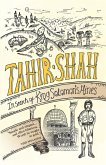Published in 1735, this first edition of Samuel Johnson's translation of Portuguese Jesuit Jerónimo Lobo's "A Voyage to Abyssinia" is a harrowing account, both "curious and entertaining," of Lobo's misadventures in an effort to convert Abyssinians to orthodox Catholicism. This 17th-century work is a unique work of both travel and religious writing where Father Lobo describes the nine years he spent in Abyssinia as a missionary.
Dieser Download kann aus rechtlichen Gründen nur mit Rechnungsadresse in A, B, BG, CY, CZ, D, DK, EW, E, FIN, F, GR, HR, H, IRL, I, LT, L, LR, M, NL, PL, P, R, S, SLO, SK ausgeliefert werden.
Hinweis: Dieser Artikel kann nur an eine deutsche Lieferadresse ausgeliefert werden.









